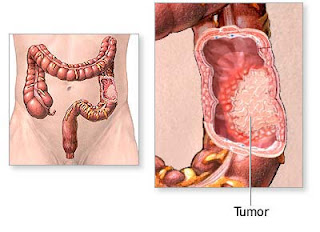Definition:
Diarrhea is a bowel movement (defecation) by the number of stools more than normal (normal 100-200 cc / hr feces). With the stool is liquid / solid half, may be accompanied by an Increased frequency.
According to WHO (1980), diarrhea is watery bowel movements more than 3 times a day.
Characterized by:
- Increased bowel sounds / peristaltic
- Improved liquid defecation
- Stool color changes
- Pain / cramping abdominal
 Nursing Interventions for Diarrhea related to Rectal Cancer / Colon Cancer:
Nursing Interventions for Diarrhea related to Rectal Cancer / Colon Cancer:1. Assist clients in meeting the needs of defecation (if bed rest to prepare the necessary tools near the bed, put the curtains and immediately dispose of faeces after defecation).
Rational: defecation can occur suddenly without any signs, so it needs to anticipate client needs to prepare.
2. Increase / maintain oral fluid intake.
Rationale: Prevents dehydration.
3. Teach about food and drink that may exacerbate / trigger the diarrhea.
Rational: To help clients avoid the agent trigger diarrhea.
4. Observation and record the frequency of defecation, stool volume and characteristics.
Rational: Assessing the development of an issue.
5. Observation of fever, tachycardia, lethargy, leukocytosis, decreased serum protein, anxiety and lethargy.
Rational: Anticipating the danger signs of perforation and peritonitis requiring emergency action.
6. Collaboration of appropriate medication therapy program (antibiotics, anticholinergics, corticosteroids).
Rational: Antibiotics to kill / inhibit the growth of pathogenic biological agents, anticholinergic to reduce bowel peristalsis and decrease the secretion of digestive disorders, corticosteroids to reduce inflammation.
No comments:
Post a Comment